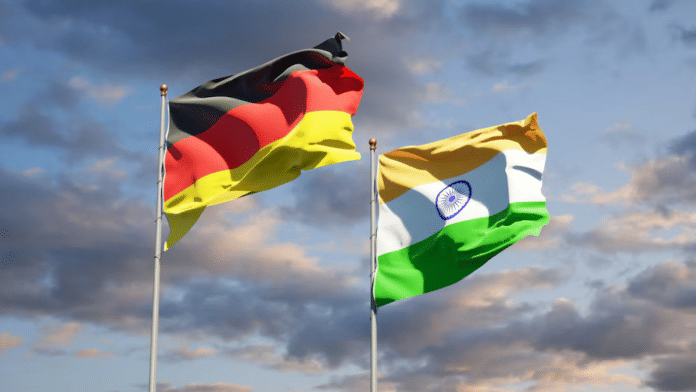New Delhi: Expanding the security partnership between India and Germany, especially to reduce New Delhi’s reliance on Russian defence purchases, along with deepening economic and energy ties and promoting this within the European Union (EU), figure in the ‘Focus on India’ paper adopted by the German cabinet Wednesday.
The new perspective on ties comes around 10 days before Chancellor Olaf Scholz and at least eight cabinet ministers are expected to visit New Delhi for intergovernmental consultations.
One of the key pillars envisioned by Berlin is in the realm of security, specifically cooperation on arms and the joint presence of German and Indian armed forces in the Indo-Pacific on a “more permanent footing”.
“The German government aims to conclude an agreement on reciprocal logistical support of the armed forces with India in order to facilitate deployments of the Bundeswehr (German armed forces) in the Indo-Pacific in the future,” the paper said.
On 22 January 2022, the German naval frigate Bayern made a rare port call, docking in Mumbai as Berlin sought to send a signal to China by sailing through the South China Sea before reaching India.
The frigate Baden-Württemberg and a replenishment ship, Frankfurt am Main, are expected to dock at Goa around the time of Scholz’s visit later this month. The two ships will be participating in a manoeuvre with the Indian Navy over several days. Similarly, the German Air Force took part in the Tarang Shakti exercise hosted by the Indian Air Force in August.
Berlin ambitious about defence trade
If the range of direct armed forces cooperation has increased in recent years, Berlin’s ambitions include a greater role for its defence industry with India.
“Germany wants to be a reliable security partner… We want India to rely more strongly on German arms companies as partners in future, not least so that it can free itself further from its arms-related orientation towards Russia. The German government will therefore expand its arms cooperation with India,” the ‘Focus on India’ paper said.
German company ThyssenKrupp Marine Services (TMSS) is one of the two companies in the running for the contract for the Indian Navy’s P75 submarine project. The other is Spain’s Navantia. Spanish Prime Minister Pedro Sánchez is expected in India the day after Scholz leaves.
The project envisions six conventional diesel-electric submarines with air independent propulsion (AIP) technology, which will allow the submarines to stay longer underwater. First envisioned in 1998, the project is now awaiting India’s final decision on the winning bidder.
Also read: German chancellor and Spanish PM to visit India back to back, submarines among key focus areas
Economic and energy partnership
Berlin is keen to deepen the economic relationship with New Delhi, especially as it aims to diversify its supply chains with the aim of making them more resilient.
China and Russia have long been important economic partners for Germany. However, since the start of the Russia-Ukraine war, Berlin has sought to search for other energy sources, aiming to cut down on its reliance on Moscow and looking to expand its economic footprint in India.
On the latter, the new paper says: “The German government will strive to overcome structural challenges which make it difficult for German companies to enter the Indian market. Especially the fast pace at which renewable energies are being expanded in India offers great potential for cooperation, as does a future green hydrogen economy and closer cooperation on critical raw materials.”
A bridge between India & EU
Berlin has come out in strong support of a comprehensive free trade agreement between India and the European Union (EU), which has been under negotiation since 2022. However, in the past few days, both India and the EU Ambassador to India, Hervé Delphin, have highlighted that there exist quite a few differences between the two parties in terms of where they stand.
Piyush Goyal, India’s minister for commerce and trade, has specifically hit out at the EU’s new environmental regulations that will come into force in the next couple of years—the Carbon Border Adjustment Mechanism (CBAM).
Acknowledging India’s concerns over CBAM—a border tax being introduced from 1 January, 2026 on seven energy-intensive sectors—the paper highlighted that Berlin would support a dialogue with India over this issue.
“In order to address the Indian government’s concerns about trade policy in light of the EU’s Carbon Border Adjustment Mechanism (CBAM), we intend to call within the EU for a constructive dialogue with India which focuses on economic incentives for climate action measures, thus promoting the clean production of industrial products in states outside the EU,” it read.
Other sectors that Berlin is looking to explore include labour mobility, sustainable development, support for reform of the United Nations and triangular cooperation with third countries—specifically in Africa.
(Edited by Tikli Basu)
Also read: Public infra funding, aiding third countries are key areas of Indo-German ties, says envoy Ackermann







Dear Germany, please take care of our cities’ infrastructure also.